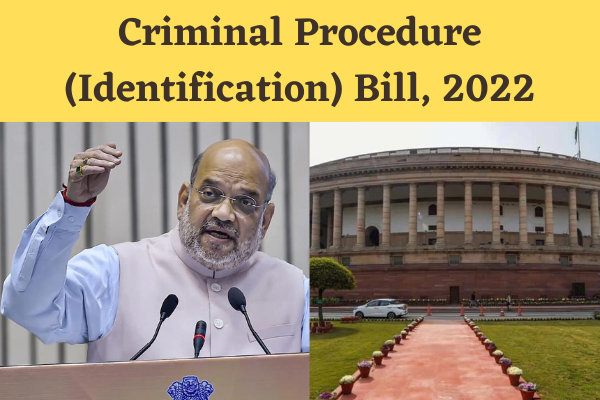- April 12, 2022
- Posted by: Maestro Legal
- Categories:

by Tanya Shrotriya*
This week the Lok Sabha ( by a voice vote) and Rajya Sabha passed the Criminal Procedure (Identification) Bill, 2022. This bill seeks to replace the Identification of Prisoners Act, 1920. In the 1980s, the Law Commission of India, in its 87th report, had recommended significant changes to the existing law. The new bill enables investigating officers to collect the biometric details of prisoners. The Bill proposes to allow Police to collect finger impressions, palm prints impressions, footprint impressions, photographs, iris and retina scans, physical and biological samples. It also proposes the collection of behavioral attributes including signatures, handwriting or any other examination referred under Section 53 or Section 53A of CrPC.
What is the Criminal Procedure (Identification) Bill?
The Criminal Procedure (Identification) Bill authorizes law enforcement agencies to collect, store and analyze physical and biological samples of convicts and other persons for the purposes of identification and investigation in criminal matters.
The Bill states that it is necessary to expand the “ambit of persons” whose measurements can be taken as this will help investigating agencies gather sufficient legally admissible evidence and establish the crime of the accused person. It is important to note that the record of these measurements will be retained in digital or electronic form for a period of seventy-five years from the date of collection.
As per the legislation, if there is any resistance from the convicts to taking the measurements, it will be termed as an offence under Section 186 of the IPC (obstructing public servant) – leading to a jail term of three months, or a fine of ₹500 or both. The government has also clarified that people who are not convicted or arrested for crimes against women or children, or those people who are in custody for an offence that is punishable for less than seven years, can refuse to give their biological samples.
Key Features of the Bill
The Bill expands:
(i) the type of data that may be collected,
(ii) persons from whom such data may be collected, and
(iii) the authority that may authorize such a collection. It also provides for the data to be stored in a central database.
Under both the 1920 Act and the 2022 Bill, resistance or refusal to give data will be considered an offence of obstructing a public servant from doing his duty.
Comparison between The Identification of Prisoners Act, 1920 & Criminal Procedure Identification Bill, 2022:
| On the Basis of | The Identification of Prisoners Act, 1920 | Criminal Procedure Identification Bill, 2022 |
| Data Permitted to be collected | Fingerprints, foot-print impressions, photographs | Adds: (i) biological samples, and their analysis, (ii) behavioural attributes including signatures, handwriting, and (iii) examinations under sections 53 and 53A of CrPC (includes blood, semen, hair samples, and swabs, and analyses such as DNA profiling) |
| Persons whose data may be collected | · Convicted or arrested for offences punishable with rigorous imprisonment of one year or more · Persons ordered to give security for good behaviour or maintaining peace· Magistrate may order in other cases collection from any arrested person to aid criminal investigation | · Convicted or arrested for any offence. However, biological samples may be taken forcibly only from persons arrested for offences against a woman or a child, or if the offence carries a minimum of seven years imprisonment· Persons detained under any preventive detention law · On the order of Magistrate, from any person (not just an arrested person) to aid investigation |
| Persons who may require/ directly collect data | Investigating officer, officer in charge of a police station, or of rank Sub-Inspector or above.· Magistrate | · Officer in charge of a police station, or of rank Head Constable or above. In addition, a Head Warder of a prison· Metropolitan Magistrate or Judicial Magistrate of first class. In case of persons required to maintain good behaviour or peace, the Executive Magistrate |
How does the Criminal Procedure (Identification) Bill 2022 empower police?
The bill in its current form allows law enforcement agencies to collect samples and data of already convicted felons and other people outside the purview of the Criminal Procedure code and offers more modern ways of identification. It especially empowers the police to take measurements of any person who resists or refuses to give measurements. The introduction of biometric data and analysis will help agencies to identify the accused despite changes in outer appearance and methods to disguise, which often hampers the investigation and prolongs it. The legislation also empowers the National Crime Records Bureau (NCRB) of India to collect, store and preserve the record of measurements and for sharing, dissemination, destruction, and disposal of records.
Conclusion
The Bill is only aimed to strengthen the capacity of the police and forensic department. The provisions of the bill are intended to preclude the use of third- degree methods (custodial torture) and making available the benefits of science and technology to prosecuting agencies.
